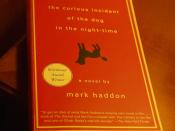When we look at Young Adult Literature or fiction as it is commonly referred to, we are cast upon fantastic journeys, adventures, new understandings and realisations that we would not come across in children's fiction, and that may not have been explored in Adult Fiction. Such books as the Harry Potter series, When the War Began series and the Twilight Saga has surrounded our young adult counterparts and single handedly improved the literature need and want of our younger generations. Such genres of Science Fiction, Historical Fiction, Comedic, Mystery and Fantasy have claimed the enthusiasm of many teenagers in the past decade. These genres' produced a series of novels that looked at the vibrant life that lies beneath ordinary lives. Written in an exquisite style, with reverence while finding under it an exciting and satisfying sub-structure of universal meaning (Bachelder et al). We as readers allow our educated minds to find a connection with many Young Adult Fiction novels.
The Curious Incident of the Dog in the Night-time is a fantastic example of this as it unravels the story of a boy who is fifteen years, three months, and two days old and the struggle to find the truth of various incidents that occur around him and the consequences he is dealt with. Within this essay I aim to draw a specific distinction between sentiment and sentimentality present in Young Adult Fiction novels, drawing references from the novel by Mark Haddon, The Curious Incident of the Dog in the Night-time. As a subset of the much larger category of books popular with young adults, young adult fiction is a genre of literature that has been developing since the mid-sixties and is now recognizably specific with its characteristics such as adolescent protagonists, narration from the adolescent's point of view, realistic...


